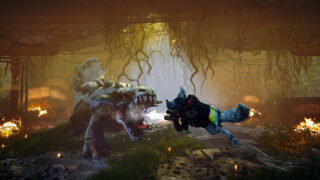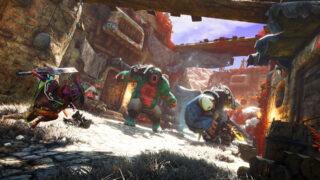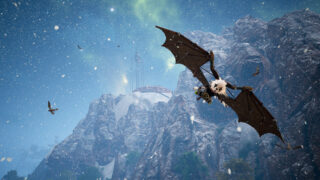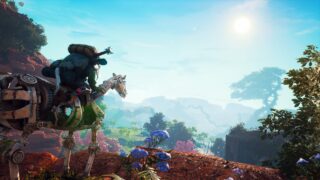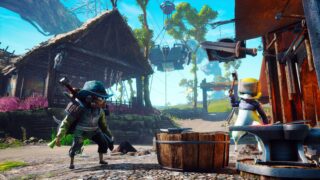Biomutant review: A wasted potential
THQ Nordic delivers an environmentally-minded adventure that’s packed with a thousand pieces of inconsequence
- Game director
- Stefan Ljungqvist
- Key Credits
- Matt Forbeck (Writer), Greger Pihl (Principal artist)

“This could be the beginning of the end… of everything,” announces the narrator. He’s a constant presence in Biomutant, commenting on what you’re doing and interpreting the gibberish speech of NPCs. Most of all, he likes to interject unexpectedly with fateful statements like this one, to stress how important or exciting your adventures are.
Sadly, it’s all just talk. Biomutant uses words to try and convince you of things it can’t accomplish through deeds. For all the narrator’s gusto, nothing in the game actually feels important or exciting. It’s packed to bursting with a thousand pieces of inconsequence.
It’s sad because, as Biomutant’s lush, post-apocalyptic open world sprawls out before you, it seems to promise so much. Green hills and dusty orange cliffs warm the air with their vibrancy, framing pockets of old-word grey – crooked telegraph poles, shopping centre shells and winding rail tracks – as objects of curiosity. Signs of an extinct ancient civilisation that brought environmental disaster upon itself.
There’s a real sense here of a new society built from the scrap of the past. A breed of mutated mammal has taken charge, a sort of cat, raccoon, weasel hybrid that wraps itself in leftover human garments, lives in wooden settlements and practices martial arts. As one of these, you’re expected to save the land from the next apocalypse, fighting rival animals and monstrous mutants while scavenging gear from the old-world ruins. Like a cross between The Last of Us and Kung Fu Panda.
To thrive you upcycle new equipment from odds and ends collected while scouring abandoned train stations and rummaging through piles of litter. An electric drill handle and a car battery form the base of a handgun. A vacuum cleaner attachment makes for a half-decent sword handle. We pin plastic stoppers and metal grills to our clothes to increase protection, then weld a handful of nails onto the end of an oversized hammer. Later, we might switch out individual parts for stronger materials, or dismantle a weapon and rebuild it from scratch. Making something out of nothing is where Biomutant shines.
But it’s an occasional distraction in a game that much more often makes nothing out of something. That enticing, undulating world is a static set that gets so much flatter once you dive into it. None of the environmental furniture reacts to your presence and you’ll need little navigational ingenuity to locate or reach bunkers and research labs. If they’re up high, circle around until you see a road. If they’re way below, throw yourself off the nearest cliff, with no penalty.
The further you go, the less these lost human places matter. You collect stuff, then leave. Most of it can be instantly scrapped. You’ll also find old-world gadgets – TVs, running machines, guitars, telephone boxes – each of which triggers a near-identical and tiresomely simple switch puzzle, then ticks a task off a list. So many places, so many things. So little wonder. Towards the end, we stopped looking.
You’ll regularly run into resistance when exploring, of course, but that’s no more engaging. There are dozens of enemy types, but for the difference it makes it may as well be three or four. All the tinkering with equipment feels redundant when most of the time you can cycle through your favourite moves, idly slashing and blasting gangs of angry furballs with whatever you have to hand, avoiding the foibles of woolly targeting and parry systems.
There’s no energy or dynamism to feed off either. Like a poorly staged film scene, blows visibly fail to connect, and the creatures on the receiving end are too minimally animated to convince otherwise, soaking up sword swings or shotgun fire, before flying rigidly across the screen when their vitality depletes. Any mild sense of impact comes from comic book ‘smash’ and ‘thwack’ captions, conscripted to fill in for the absence of any genuine smash and thwack. Words instead of deeds.
“That enticing, undulating world is a static set that gets so much flatter once you dive into it. None of the environmental furniture reacts to your presence and you’ll need little navigational ingenuity to locate or reach bunkers and research labs.”
Even bosses, the game’s four ‘worldeaters’, are little more than giant lumbering cuddly toys. Preparing for them is more intimidating, as you have to endure multiple fetch quests – pure padding – to find a particular vehicle, such as a mech or a jet ski, then kit it out with various upgrades and armaments. When battle does finally commence, it’s not attack patterns so much as clumsy visual design that makes the rogue beasts any kind of challenge at all.
As for the vehicles you spend so long assembling, they aren’t as fun to pilot as they might be. And while they remain on call throughout your journey, they’re never incorporated into additional quests or challenges. This sums up a game that’s supposed to champion recycling and conservation, but keeps binning things before they’ve been put to proper use. So much here, right up to shops or entire villages, can be easily ignored without a tickle of FOMO.
Most of all, this is true of a morality system that’s meant to be a big deal, but winds up crass and stupid. Early on, you can choose to ally with one of two tribes, with the potential later to switch allegiance between six in total (although we never once had the opportunity in our initial playthrough). Tribes are aligned with ‘light’ or ‘dark’ tendencies, and whichever you plump for you’ll need to take over rival camps to propagate their goals in the world.

Yet as much as the narrator assures you there’s no correct decision and encourages you to direct the world as you wish, it rings hollow when the choice on offer is between unifying peace and genocidal fascism. It’s the kind of crude moral extremism we hoped we’d seen the last of in games over a decade ago. But instead, here we are, with ethnic cleansing dressed as an interesting moral choice.
It’s no more subtle elsewhere either, as you make micro-decisions that pump your light or dark rating up a notch, to unlock separate suites of magic powers. Release a captive from a cage and you get to decide whether to offer aid or punch them in the face for no reason, while conversations are littered with ‘selfish’ dialogue options that no self-respecting selfish person would be dumb enough to say out loud.
Still, you may as well go dark sometimes, because the NPCs in Biomutant are such non-entities, even they don’t seem bothered. Those you speak to at length spend more time lecturing you about choices and consequences than revealing any hint of personality, so it’s impossible to develop favourites. Except the game expects you to do just that, as it heads towards its grandly underwhelming finale.
“So much here, right up to shops or entire villages, can be easily ignored without a tickle of FOMO. Most of all, this is true of a morality system that’s meant to be a big deal, but winds up crass and stupid.”
Indeed, the only character we formed any feelings towards was the narrator, who we increasingly came to resent. His live translation gimmick disrupts the flow of conversation, while his random observations (which can be switched off) spurt like half-remembered mottos from a wistful drunken aristocrat. With the script’s odd concoction of gravity, whimsy and clanging neologisms for human artefacts – trains are ‘chugga chuggas’, and so on – it’s like listening to Stephen Fry read A Clockwork Orange for Jackanory.
There’s still something vaguely pleasant about wandering Biomutant’s colourful countryside, even a little impressive about the number of buildings there are to explore, and things to find inside. But after 20 hours, we’d ambled apathetically to the end, and nothing had stuck. Except, that is, for one valuable lesson: things aren’t exciting or important just because someone says so. We need systems and characters that make us care. No amount of junk can compensate for that.
Biomutant’s feature list seems to include everything a successful open-world action RPG needs. But journey through its towns, fields and bunkers, and there’s no intrigue in its exploration or weight in its relationship building. Not even a worthy combat challenge to hold everything together. With so many ideas left under-developed, it wastes a setting that had far more potential.
- A lush green world full of locations to find
- Crafting weapons from scrap is enjoyable
- Exploration is repetitive and one-dimensional
- A lot of missions feel like needless padding
- Combat offers little dynamism or challenge
- Characters lack personality and the narrator irritates
- The morality system is offensively stupid

